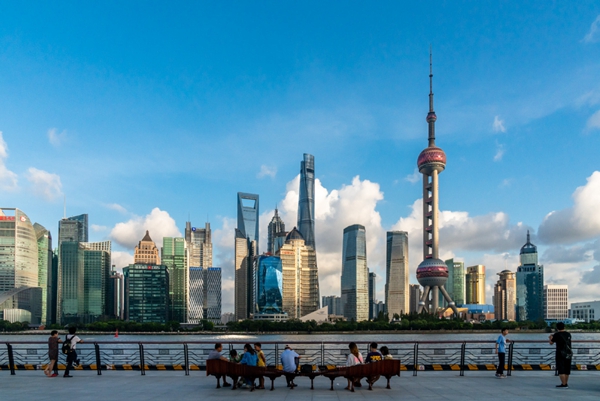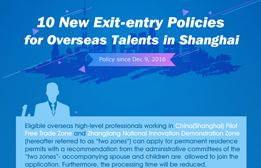Shanghai set to lead talent development

Lujiazui, the financial center in Shanghai, forms a perfect backdrop to the Bund area. [Photo by Wang Gang/For China Daily]
Shanghai, an international metropolis that is highly competitive in fields such as investment, trade, finance, technology and culture, has been continuously deepening the reform of its talent development mechanism and optimizing the innovation and entrepreneurship ecosystem over the past decade.
The city is now ramping up efforts to shoulder the strategic task of building a highland for talents, attract professionals from all over the world and achieve a two-way movement of urban development and people.
Reform of talent development mechanism
Deepening the reform of the talent development mechanism is a strategic move to build on the advantages in the talent system and boost high-quality development.
Shanghai has loosened restrictions to invigorate a more-dynamic and vibrant market for both employers and talented people with an array of incentive policies.
In 2015, Shanghai issued the Implementation Opinions on Deepening the Reform of Talent Work Mechanisms to Promote Innovation and Entrepreneurship, known as the 20 Measures for Talents. A year later, it introduced the 30 Measures for Talents and released the Implementation Opinions on Further Deepening the Reform of Talent Development Mechanisms to Accelerate the Construction of Globally Influential Science and Technology Innovation Center.
In 2020, the city issued the Several Opinions on Implementing the Talent-Led Development Strategy in the New Era of Shanghai, further strengthening the gathering of professionals in China and abroad. In 2021, the 14th Five-Year Plan for Talent Development in Shanghai was unveiled, clarifying the goals and key tasks for talent development in the long run. In addition, Shanghai also announced the Implementation Rules for Supporting Talent Development in Five New Cities, providing guarantees for talent development in districts such as Jiading, Qingpu, Songjiang, Fengxian and Nanhui.
This year, Shanghai released the Several Opinions on Further Delegating Power and Loosening Restrictions to Stimulate Scientific and Technological Innovation, which will stimulate the vitality of scientific and technological innovation and support various types of entities and talents.
Shanghai has also done away with several administrative approval and filing matters for talent recruitment, title evaluation, personnel mobility and other processes to ensure the autonomy of personnel recruitment in institutions such as universities and research centers. It has delegated the management authority of job appointment, performance assessment and income distribution to employers and allowed universities and research institutes to independently attract talents within the approved quotas.
"We are more confident in attracting high-level talents in the field of agriculture from both China and abroad," said Yu Li, deputy director of the organization and personnel department of the Shanghai Academy of Agricultural Sciences.
In terms of talent evaluation reform, Shanghai has launched the Implementation Plan for Classifying and Promoting the Reform of Talent Evaluation Mechanism, which focuses on establishing a talent evaluation orientation by taking moral character, ability, performance and contribution as the main criteria.
In particular, it emphasizes the role of employers and supports them in exploring evaluation standards and making breakthroughs.
Shanghai has taken the lead in integrating the integrated circuit, artificial intelligence and biomedicine industries to promote the development of talent evaluation standards which is being led by leading enterprises.
In 2021, Pudong New Area launched Shanghai's first district-level engineering series evaluation project on senior titles with the aim of optimizing services and broadening the channels for biomedical professional and technical talents.
Another example is ShanghaiTech University's exploration of a new talent evaluation mechanism with the tenure system as the core, which draws on the experience of internationally recognized evaluation methods. The key indicators include ethical conduct, teaching and education, academic level, development potential and international recognition.
The faculty at ShanghaiTech University are of the top echelon, youthful and global in nature. Nearly one-third of them are involved in various national and Shanghai high-level talent projects. Roughly 84 percent are young scholars under the age of 45 and 95 percent have overseas study and work experiences.
To further advance sci-tech R&D, Shanghai will explore the establishment of new R&D institutions with characteristics like unspecified administrative levels, flexible positions, unlimited salaries as well as integrated budget management. It will also create a chief scientist responsibility system to grant top talents the rights of personnel, finance, materials, decisions and internal organization settings. Top talents can independently decide on personnel forms, numbers, salaries, evaluations and terms of employment.
Shanghai is also striving to facilitate the transfer or the transformation of scientific and technological achievements with incentive policies. More than 70 percent of the net income from the transfer or transformation of scientific and technological achievements can be used to reward individuals and teams, and this will inspire personnel and give rise to the number of successful cases.
For example, in 2017, the Interdisciplinary Research Center of Biology and Chemistry led by professor Yuan Junying sold the global exclusive development license for an anti-cancer new drug for a total of $457 million. This is currently the largest achievement transformation cooperation project in China's pharmaceutical field.
Statistics show that Shanghai has accounted for more than 15 percent of the national scientific and technological awards for five consecutive years. Over the past three years, it has accounted for over 20 percent of the first prizes. Shanghai scientists have published more than 25 percent of the papers in the top three international academic journals: Nature, Science and Cell.

 Print
Print Mail
Mail




